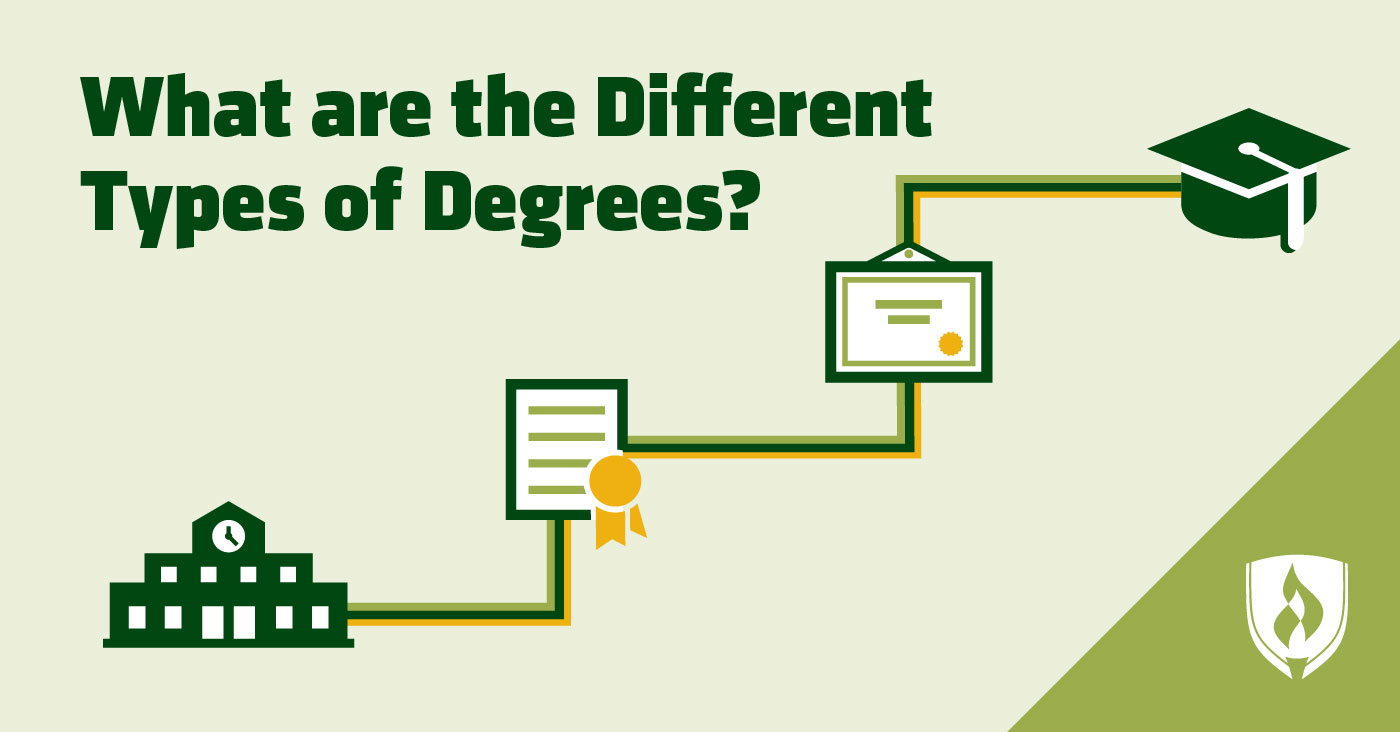
At this point in your life, you know yourself well enough to determine that after years at your current job, it’s the right time to look into earning a degree and discovering all of the career possibilities that await you. But getting started is the tough part.
You’ve undoubtedly encountered the tangled alphabet soup graduates list next to their names: AS, AA, BA, BS, BFA, MA, MB, MFA, PhD, etc. And you definitely wouldn’t be the first to feel both confused and intimidated by all of the alphabetical possibilities for your education.
Everyone needs a hand getting started, especially in the wake of such an important decision! So take a look at an essential breakdown of the different types of degrees and move forward deciphering the education plan that’s perfect for you.
Types of Degrees
1. Certificates & diplomas
It can be easy to get lost in all the different levels and terminology used when referencing higher education, so let’s just start with the basics: what are certificates and diplomas, and how do they differ from other degrees?
Try thinking of it in this simple metaphor: If we’re baking a 5-layer cake, certificates and diplomas would make up the first layer. They are non-degree offerings that rest just under an associate degree. These certificates are often available in both vocational and technical fields such as medical assisting and automotive technology.
They typically take less than a year to complete and, because they focus on teaching a single skill, they can propel you quickly into a career in medical administration, practical nursing, human services, early childhood education and so much more.
2. Associate degree
An associate degree is a 2-year degree (when studying full-time) that is comprises a student’s freshman and sophomore years of college. This degree, as with most, is multifaceted depending on your field of study, branching off into a few different sectors: Associate in Science (AS), Associate in Arts (AA) and even Associate in Applied Science (AAS) and Associate in Fine Arts (AFA).
Associate degrees are becoming increasingly more desirable because they are quicker than earning a bachelor’s degree and, by extension, cost less. But don’t let the shortened time lead you to think you’ll find it difficult to discover career success. Many associate degree holders go onto land jobs they are passionate about that offer a salary fit to support their families.
Some of the well-paying jobs you could get with an associate degree include cardiovascular technician, computer network support specialist, registered nurse, dental hygienist and air traffic controller.
3. Bachelor’s degree
A bachelor’s degree, sometimes referred to as a baccalaureate degree, generally takes four or five years to complete. The course layout for this degree typically includes all the required general education classes (such as English, psychology, history and math), major-specific classes required for your chosen degree and a handful of electives.
A Bachelor of Arts (BA) or a Bachelor of Science (BS) is considered the ‘most traditional’ college degree and can propel degree holders to work in a vast number of fulfilling professions. Potential jobs can range from positions in accounting to jobs in psychology to full-time gigs in criminal justice.
If you’re looking to work your way up to a profession that requires a master’s or a doctorate degree, a bachelor’s degree is an integral part of the necessary groundwork you’ll have to lay to get there. For more on those degrees, read on!
4. Master’s degree
A master’s degree, like most of the degrees we’ve covered thus far, can be split into a few different sub-categories depending on your chosen field of study: Master of Arts (MA), Master of Science (MS), Master of Fine Arts (MFA) and Master of Business Administration (MBA). The requirements for master’s degree programs can vary with each school and each chosen subject, but they all do require a bachelor’s degree as a prerequisite.
Most master’s degree programs are flexible, offering both full and part time student schedules, as well as the option of night and weekend classes to fit around weekly work schedules. That said, these degrees can take anywhere from nine months to four years to complete, considering variables like course requirements and the volume of coursework the student chooses to assume.
Some in-demand careers that require a master’s degree include physical therapists, medical scientists, mental health counselors and veterinarians.
5. Doctoral degree
A doctorate degree is considered the highest level of formal academic training. You’ve likely heard it referred to as a PhD, but that is simply in reference to a Doctor of Philosophy, which is a generic title that covers a wide range of fields including English, astrophysics and chemistry. One can also become a Doctor of Engineering (D.Eng), Doctor of Education (EdD), Doctor of Medicine (MD) and more.
Doctoral degrees have traditionally required the student to earn the degree in a classroom, but these days online doctorates are being offered much more frequently and can be earned in as few as three years. But some fields are more demanding (think law school or medical school) and can take up to eight years to complete.
Only about 0.9 percent of Americans have earned a doctoral degree. There is, however, an impressive repertoire of jobs for which a doctoral degree can qualify you, some of which include working as a psychologist, surgeon, doctor, professor or high-level research scientist.
Which path is right for you?
The assortment of certification and degree options might seem intimidating at first, but the varying possibilities exist so that you can find the perfect path toward the career best suited for you and your family. They’ll thank you for taking the time to carefully sort out your education plan one day!
Now that you have a better understanding of the level of commitment each degree requires, it’s time to explore! Check out Rasmussen College’s Career Roadmap and begin your journey to a fulfilling career.




